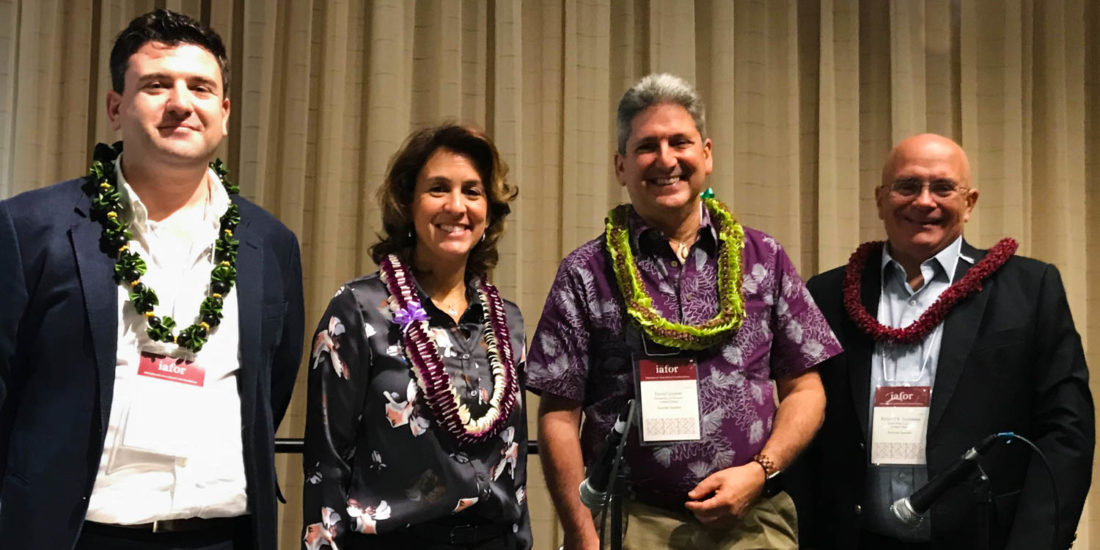Kicking off the joint plenary session of the IAFOR International Conferences on Education (IICEHawaii) and Sustainability, Energy and the Environment (IICSEEHawaii), were Dr Christina M. Kishimoto (above second from left), Superintendent of the Hawaiʻi State Board of Education, Dr David Lassner (above second from right), President of the University of Hawaiʻi, and Dr Richard R. Vuylsteke (above right), CEO of the East-West Center, in a panel chaired by Dr Joseph Haldane (above left), Chairman and CEO of IAFOR. The plenary panel was entitled “Education and Sustainability: Local Lessons from Hawaiʻi”, and three of the State’s leaders joined to give their reflections on leadership and positive change around the conference theme of “Independence & Interdependence”. The panel invited reflections on the desirability, extent and limits of our individual independence and autonomy, of that of our students, and of the institutions and structures within which we work, teach and learn. We do not educate, and are not educated in vacuums, but in such contexts and constraints as families, groups, and societies; of nations and cultures; of identities and religions; and of political and financial realities.
Superintendent Kishimoto is currently implementing an ambitious plan targeted around three high impact strategies: School Design, Student Voice, and Teacher Collaboration at the Department of Education. Among other things, she talked of the challenges of delegation through layers of leadership in a large public school system, and of how to assure responsive decision making. She noted that while many principals at the school level desired the delegation of responsibility down from the superintendency, there was sometimes a difficulty in ensuring that decision flows were delegated properly down to the next levels of decision makers, and not “hoarded” or simply transferred.
Dr David Lassner, President of the University of Hawaiʻi system, and concurrently Chancellor of the University of Hawaiʻi at Mānoa, spoke of the challenges of providing excellence across a large and diverse system with a diverse population. A member of the audience from New Zealand asked about provision for indigenous peoples and indigenous education. Indigenous populations in Hawaiʻi are far more rooted to place, and are therefore often less willing to travel outside their communities. Dr Lassner talked of the importance of educational technology in enabling the university system to reach outside the walls of the classroom to enable students in more remote locations access to education. The University of Hawaiʻi places a great emphasis on acknowledging and valorising indigenous knowledges and is, for example, a world-leading center of ethnomathematics.
Dr Richard R. Vuylsteke, spoke of the work of the East-West Center, and of how the center encourages international exchange. On leadership, he talked of leading by example when it came to engaging with peoples in different languages, and of making sure that people knew that they were expected to engage outside their linguistic and country groups in order to learn from each other. Dr Vulsteke also stressed the importance of collaborations between the academy and the business world, as well as what developed countries could learn from the developing world.
Although the wide ranging panel focussed on problems specific to the islands that make up Hawaiʻi, many of the issues discussed were of experiences that resonated with the conference audience of over 300 people from some 40 nations.
This is the fourth year of the IAFOR conference series in Honolulu in January, held in collaboration with the University of Hawaiʻi at Mānoa (UHM), and at the Hawaiʻi International Convention Center. We would like to thank the 2019 conference Organising Committee, and most particularly Professors Xu Di, David Ericsson, Curtis Ho and Michael Menchacha of the UHM for their dedication to the event. The 2020 conference will be held on January 4-6, 2020.
Visit the IICEHawaii website
Visit the IICSEEHawaii website

